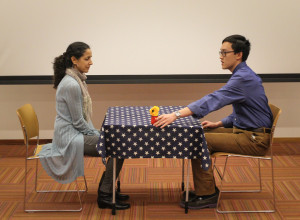Julie Winokur, Emmy-nominated and world-renowned documentary film director, shared her new project, Bring it to the Table, with Stanford students Tuesday evening through a special event with Stanford in Government (SIG).

Bring it to the Table is an initiative Winokur started after her son accused her of being “intolerant” of other views, specifically those espoused on Fox News. Her solution was to sit down at a simple folded table with a patriotic cloth draped over it and talk with over a hundred different people with varied backgrounds and opinions about their political views.
“We need to be able to have civil discourse,” Winokur told her audience Tuesday, “because if we can’t engage with those we disagree with, it is the death of democracy.”
Winokur opened the event by showing the film she had crafted to highlight what she found while traveling the country and talking to fellow citizens. The film, which has not been widely released yet, shows snippets of the conversations Winokur had with attendees of the Republican and Democratic National Conventions in 2012 as well as people in towns across America.
Those she interviewed had very strong opinions on everything from abortion to Obamacare. Winokur explained it was hard for her at first to listen without trying to argue. Eventually, however, she realized how crucial it was to be able to sit and listen.
“It’s an art that we no longer teach,” Winokur said.
“In America our idea of listening is waiting for the other guy to stop speaking,” one man told Winokur while sitting down at her table.
“What I’m hoping to do in sharing this film is to reclaim the idea of civil discourse. If I disagree with you we should talk about politics,” Winokur emphasized.
After the film Winokur fielded several questions from audience members. Then, with cheers from the audience, she pulled out her iconic table that she had brought all the way to Stanford and invited volunteers to come and talk with her.
Justin Hsuan ’18 was the first to the table. As she does with everyone she talks with, Winokur asked Hsuan to move the potted flower to indicate where his political affiliation lies on a spectrum from liberal to conservative. Hsuan placed the flower on the most conservative end.
Hsuan’s parents were immigrants to America and inspired him to believe that hard work can accomplish great things.
“My parents went from poverty to being able to pay for full Stanford tuition in just eighteen years,” Hsuan explained. This, coupled with the fact that Hsuan has done research on economic policy to determine his own opinions about fiscal policy, has moved Hsuan to identify as a conservative.
Two things Winokur always ask those who sit down at her table are “What does the other side get right?” and “Where have you changed your mind?”
She finds that these questions open up the discussion to acknowledge that no side has all the right answers and often, people have opinions that cross party lines.
Hsuan admitted that he considers himself to be more socially liberal and that he has changed his mind on both gay marriage and immigration — two topics that Winokur says most conservatives have evolved their opinions on.
The next volunteer to the table was Andrew Granato ’17, who placed the flowerpot on the opposite end of the spectrum as Hsuan, indicating his equally as strong liberal affiliation.
Granato explained that his realization of the necessity for government assistance was when a friend in elementary school who was in the academically gifted program with him but had a very tough family life ended up dropping out of high school. Had his friend had the same advantage of Granato’s supportive background, maybe he too would have ended up at Stanford, Granato said.
“Life essentially throws us around and we have a very limited way of dealing with that,” Granato explained. When Winokur pushed him further about the number of people who abuse the welfare system, Granato said “I don’t think that excuses us from our moral obligations.”
Winokur was able to push both Hsuan and Granato to think about both sides of issues with her well-worded questions that probed further but did not use such caustic language as is often seen in heated debates on television.
Bring it to the Table hasn’t convinced Winokur to change her views dramatically, but it has opened her mind to the fact that neither side has it all right or wrong. “I now find myself with a group of my liberal friends defending the conservative side,” Winokur laughed.
Winokur reminded her audience that discourse is crucial amongst the people of America because ultimately the people are who control the direction of our country. “Our constitution begins with ‘We the people,’” Winokur underscored, “We. Not an individual. But We.” That “We” is exactly who Winokur aims to bring to the table and encourages others to do the same.
Contact Elizabeth Wallace at wallacee ‘at’ stanford.edu.